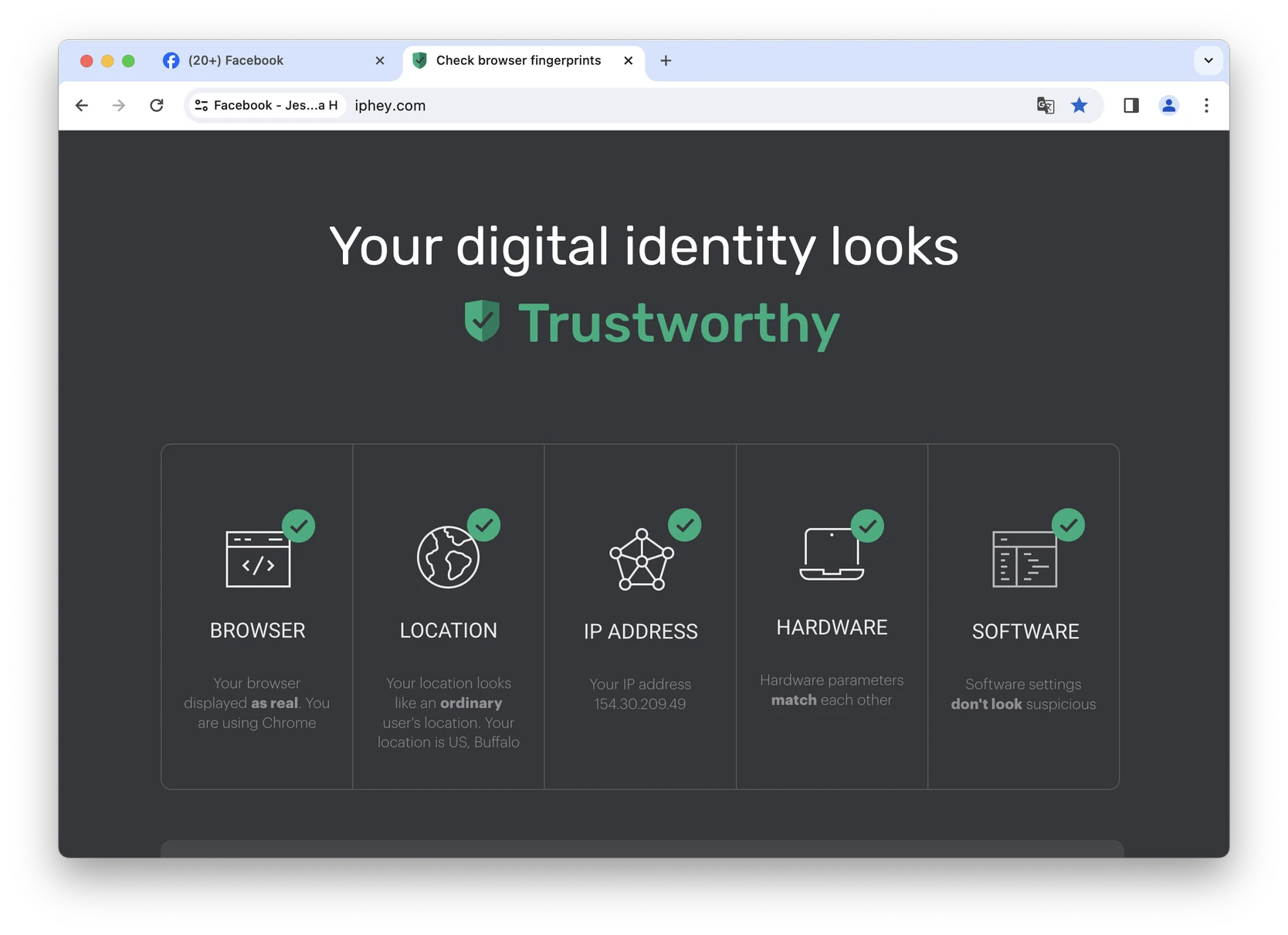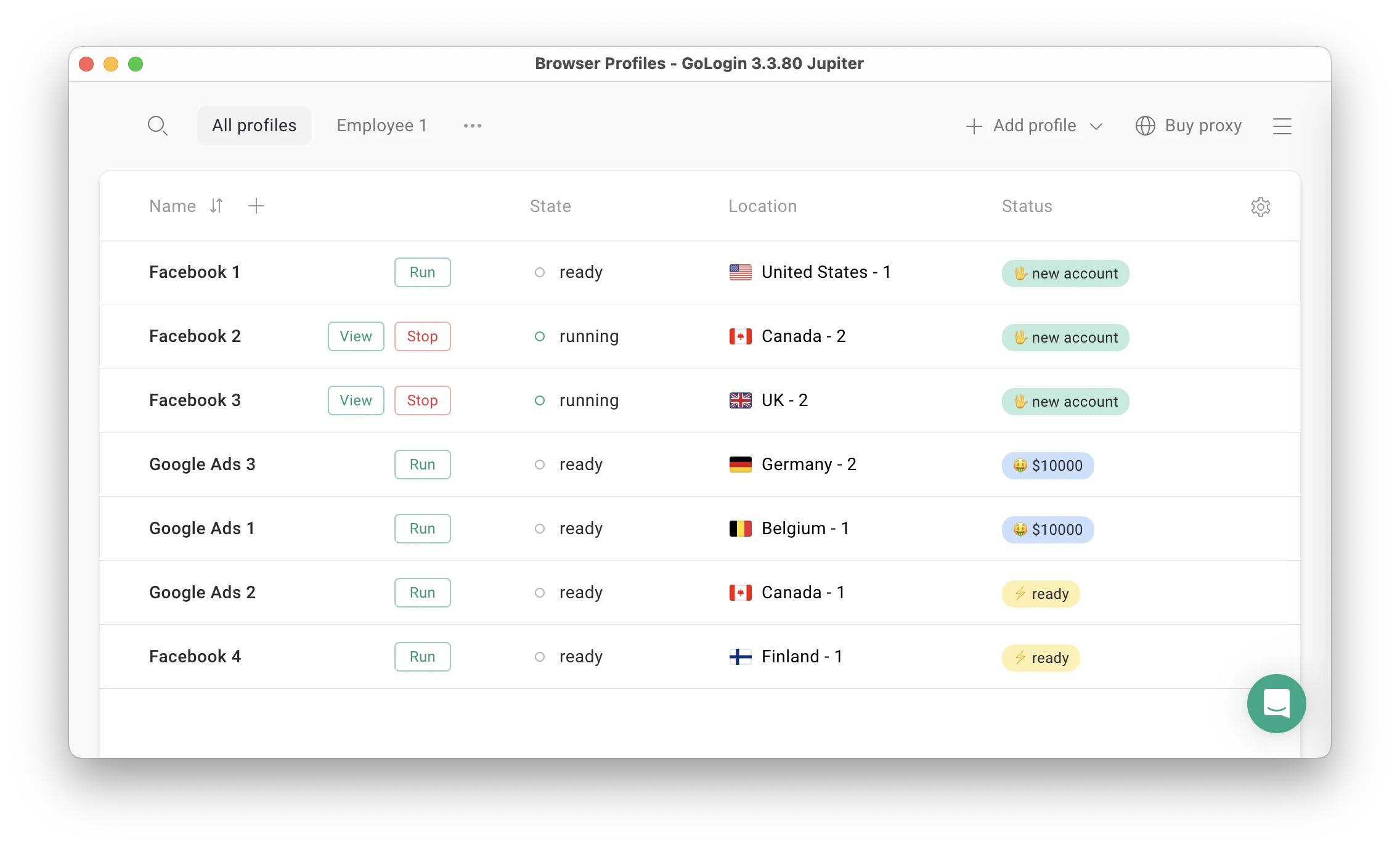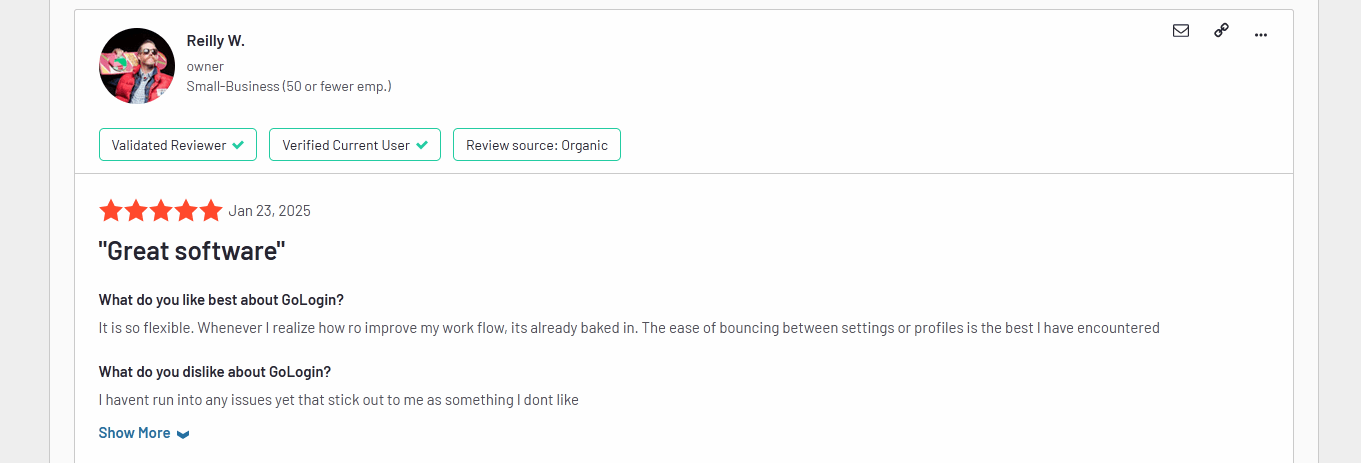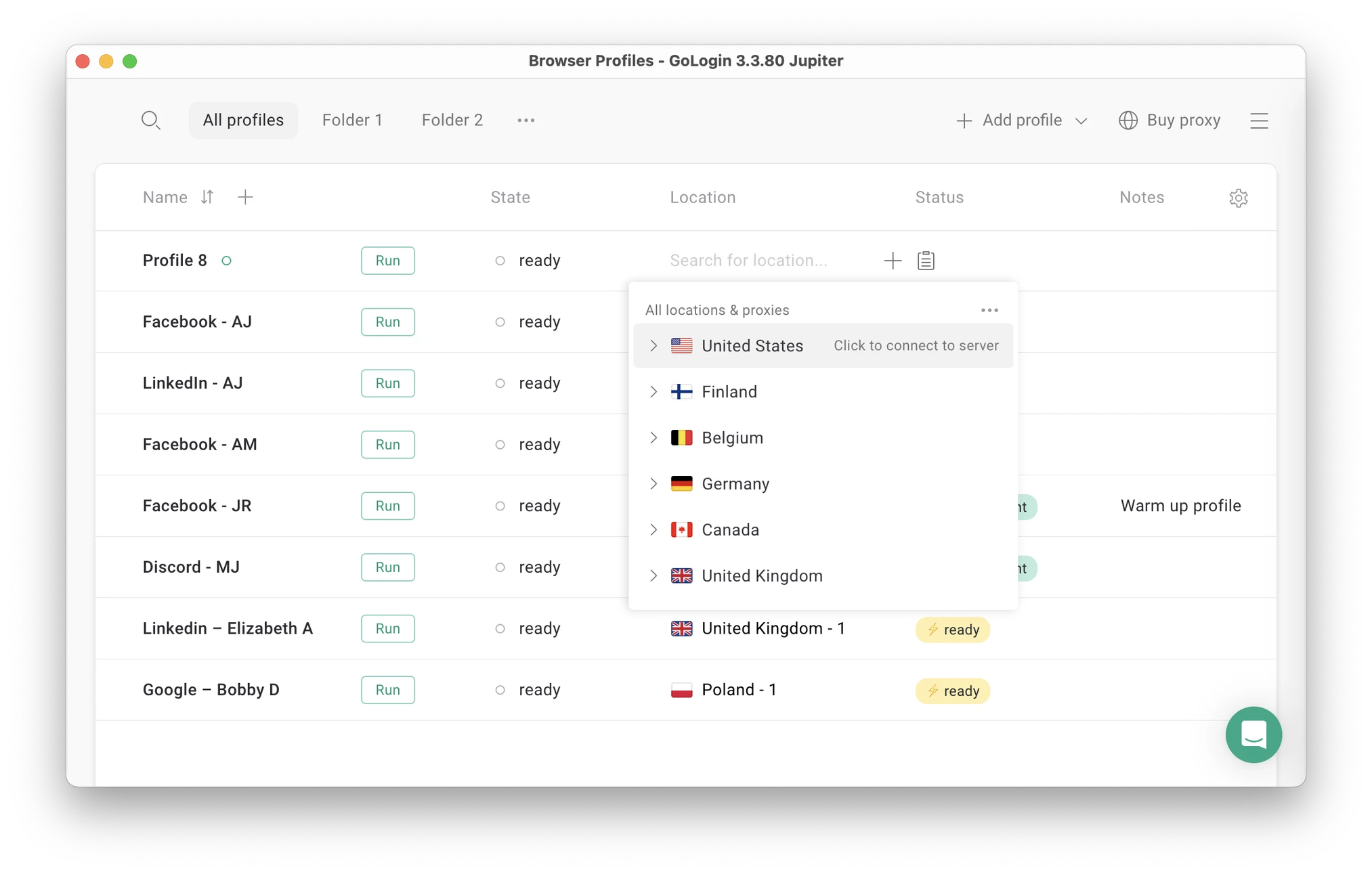An antidetect browser is a tool designed to help users stay anonymous and protect their identity while browsing the internet.
In 2025, antidetects are widely used for commercial reasons such as managing multiple social media accounts (for example, by digital marketing agencies). They actually protect social accounts from restrictions, because other methods (using a VPN or a different browser) are ceasing to work.
How Does Antidetect Browser Work?
Modern websites are able to track a whole lot of your device and browser parameters with a technique called browser fingerprinting.
When you use a regular browser, websites can easily track you by collecting information about your device, operating system, and even your location. This information is known as your “digital fingerprint“. An antidetect browser changes these details, making your online fingerprint look different every time you browse.
By altering or masking your unique identifiers and browser engine itself, you make it very difficult for websites to collect your data.

Antidetect simply presents you as a new real user, preventing a social media website from blocking you. Read on to see how this is different from a VPN.
Read more:
- What Is Device Fingerprinting, And Should You Care?
- What Is Browser Fingerprinting? Tools To Protect Yourself
- What Is Canvas Fingerprinting? Quick FAQ
Why Do People Use Antidetects?
Antidetect browsers have a lot of different legitimate use cases, both commercial and personal use:
- Managing Multiple Accounts: If you run multiple social media accounts, an antidetect browser allows you to manage them without getting flagged for suspicious activity. This is particularly useful for SMM people, digital agencies, HR and recruiters, affiliate marketers and freelancers.
- Operating Remote Accounts & Teamwork: A digital marketing agency requires specific tools to control client accounts. With today’s restrictive social media such as LinkedIn or Reddit, remote teams need antidetects to safely operate accounts from multiple locations without restrictions.
- Bypassing Location Restrictions: A good anti detect browser provides you with a clean proxy IP address instead of yours. This allows you to use websites otherwise unavailable in your country. This way you can also protect your sensitive accounts from restriction if you travel a lot.
- Privacy Enthusiasts: Many individuals want to keep their online activities private, especially if they are concerned about data collection by big tech companies. An antidetect is able to provide best possible level of anonymous browsing.
- Web Scraping: Data collection companies require antidetects or similar systems to protect their automated scrapers from being blocked. If you ever met a Cloudflare click captcha entering a website – that’s the thing.

Are Antidetects Legal?
Yes, antidetect browsers are legal. Using an antidetect to run multiple accounts will not cause any trouble.
However, just like with any other tool – how you use them is crucial. Using antidetects for illegal activities (like fraud or data theft) is against the law. It’s essential to always stay within legal boundaries and use these tools for ethical purposes.
I also encourage you to only use antidetects from trusted vendors, such as GoLogin.
Are VPNs or Proxies Not Enough?
If we’re talking about modern social media, then no.
Even a couple years ago using a VPN (Virtual Private Network) or a proxy service was enough for online privacy. Both can enhance your security up to a certain point, however they are not enough if you want to protect your social media accounts. Here’s why:
- VPN encrypts your connection and hides your original IP address. However, a VPN does not change your browser fingerprint. Websites can still identify your browser and device settings, which means you can still be tracked in some cases. Plus, modern social media (such as Facebook) can immediately restrict you for using a VPN connection: they consider any encryption suspicious.
- Proxies hide your IP address simply by giving you a new one. However, like VPNs, they also do not provide the same level of fingerprint masking as antidetects. Proxies do not encrypt your traffic, however your device is still exposed to browser fingerprinting. Proxies can be safely used only together with an antidetect.
What Are Clean IPs?
Both VPNs and proxies can have a history of past use. For example, if a free proxy was used for illegal activities by someone, a website will add it to blacklist. If you use that same IP later, you can be immediately blocked.
Using an antidetect browser in combination with a clean proxy is the absolute best approach.
Pros & Cons Of Using Antidetect Browsers
Pros:
- Multiple Account Management: Run any amount of social accounts without getting flagged.
- Useful for Teams: Great for agencies with remote teams requiring to seamlessly manage many accounts from anywhere.
- Real Privacy: Your data is actually protected from tracking, even on most advanced websites.
Cons:
- Learning Curve: Antidetects typically require some tech background. In this case, GoLogin can be recommended: it’s designed for non-technical people in the first place.
- Price: Antidetects require a lot of development and updates to stay safe. For this reason they can get expensive, especially on scale.
- Shady Reputation: There are a lot of small antidetect browsers coming from unknown companies. Beware of using shady tools with no reputation, as they can sell your data.
Best Antidetect Browser Brands In 2025
If you’re considering using an antidetect browser, here are some popular options:
- GoLogin: Best choice overall with an affordable price tag. GoLogin has the best reputation online, marked Easiest To Use for a new user among competition by G2 review platform.
- Multilogin: A popular choice for managing multiple browser identities. First antidetect on the market back in the day, Multilogin browser offers good reliability, however under a heavy price tag.
- Octo Browser: With a clean UI and great reliability record, Octo may be a bit too expensive and be less known on Western market. However, it is well maintained and provides needed safety.

How to Choose an Antidetect Browser?
First of all, look for options that have a free trial. This way you will quickly get an idea if the tool works for you or not.
Here are some tips to help you make the best choice:
- Determine Your Use Case: Think of exactly why you need an antidetect browser. Knowing your primary use will guide your decision.
- Check User Interface: A user-friendly interface can make a huge difference. Make sure the browser is easy to navigate and won’t require a developer to use.
- Check OS Compatibility: See if the antidetect browser will work on your exact device.
- Check Support Channels: Good customer support can be invaluable. Check if the browser vendor team provides demo calls and offers assistance.
- Check Reviews: See what people say online. Keep an eye on reviews that seem identical or AI-written: look for real human feedback.
How To Use An Antidetect Browser?
Typically an antidetect will provide you with virtual browser profiles. Think of them as completely separate computers – that’s how websites see them.
Here are the basic steps of using an antidetect, with GoLogin as example:
- Create a new browser profile. In GoLogin, it’s done with one click: you don’t need to adjust any settings. Create multiple profiles for more accounts.
- Add a proxy IP to the profile. Most antidetects allow to use third party IPs. GoLogin offers built-in IPs, so you don’t have to look for another service.
- Run the profile. Running opens a window that’s exactly like Chrome or Firefox: browse like you would normally do.
- Share profile (optional). You can send the profile to your partner: they will not have to login your social accounts.

Final Thoughts
- Antidetects are mostly used for commercial use cases. They protect user’s digital identity by providing a new real one.
- A VPN or Proxy doesn’t protect your data due to wide usage of browser fingerprinting on websites.
- GoLogin is by far the most optimal choice providing built-in proxies, easy UI and great tool reputation overall.
Interested in trying GoLogin out? Sign up for a 7-day free trial, or request a free demo call to see how GoLogin will work for your use case.
FAQ
What is an antidetect browser and how does it work?
An antidetect browser is a Chromium/Firefox-based tool that lets you run isolated profiles with different, realistic browser fingerprints (UA, canvas/WebGL, fonts, timezone, etc.), so each profile appears as a separate device/user. It’s used for privacy and multi-account workflows beyond what a proxy/VPN alone can do.
Is using an antidetect browser legal?
The software itself is legal; how you use it matters. Legit tasks (testing, ads verification, SMM, geo-QA) are fine, while misuse that breaks laws or site ToS can be blocked or pursued.
Do I still need a proxy or VPN with an antidetect browser?
Usually, yes. Antidetects randomize the fingerprint, but you still need a proxy/VPN to control the IP. VPNs encrypt traffic but don’t prevent fingerprinting; proxies/VPNs are commonly combined with antidetect browsers for full separation.
Can websites detect or block antidetect browsers? Are they “safe”?
They reduce linkability, not eliminate it. Modern anti-fraud stacks use fingerprinting + behavior/telemetry; inconsistent setups or suspicious activity can still trigger checks/blocks. Good OPSEC and quality proxies remain essential.
Is this the same as Incognito/Private mode?
No. Private/Incognito mostly controls local history/cookies; it doesn’t meaningfully change your browser fingerprint, so sites can still recognize you.
What is an antidetect browser and how does it differ from a standard browser?
An antidetect browser is a modified browser (often based on Chromium or Firefox) designed to mask a user’s digital fingerprint—such as user agent, canvas/WebGL responses, timezone, and more—making each profile appear as a distinct device. This level of spoofing goes far beyond what VPNs, proxies, or incognito mode can offer.
How do antidetect browsers work to prevent tracking?
They mask or alter key browser and system identifiers by:
-
Randomizing or spoofing data like browser headers, canvas rendering, WebGL, fonts, timezone, screen resolution, and hardware details.
-
Creating isolated profiles, each with its own cookies, cache, localStorage, etc., ensuring that tracking data doesn’t leak across sessions.
Download GoLogin for free and manage multiple accounts without bans!
Read other posts about anti-detect browsers:
Which Antidetect Browsers Perform Best in Anti-fingerprinting Tests
Best FREE Antidetect Browsers
10 Best Antidetect Browsers
The Ultimate Anti Fingerprint Browser List
Antidetect Browser for Android
Device Fingerprinting Explainer
Virtual Machine vs. Anti-Detect Browser


